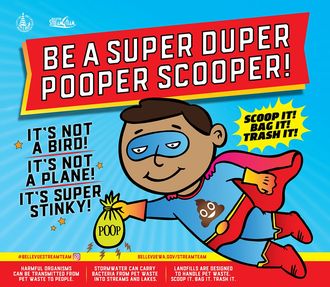
Pet waste contains harmful microorganisms that can be transferred to humans. There is estimated to be over 30,000 dogs in Bellevue. There is nothing natural about that amount of raw sewage from that many animals left outside on lawns and sidewalks every day. Thank you for helping keep our families healthy, surface water clean and our shoes free of poo.
Frequently Asked Questions
How big is the problem, really?
- The American Veterinary Medical Association reports 37.4 percent of Washington households own dogs.
- The average dog-owning household has 1.5 dogs (Bellevue has approximately 55,000 households).
- 37.4 percent of 55,000 is 20,570. Multiply that by 1.5 and you get 30,855 dogs. Bellevue has over 30,000 dogs.
- At 0.25 pounds of solid waste per dog, that’s about 3.75 tons of raw sewage every day.
Why should you scoop?
- Pet waste is raw sewage.
- The contents of dog waste are harmful to children.
- Harmful organisms in dog waste can persist in the environment for more than two weeks.
- Pet waste degrades water quality.
- Diseases and parasites carried by dogs can be passed to wildlife.
What should I do?
The environmentally preferred way to dispose of dog waste is to bag it and place it in the trash.
Raccoons/bears/coyotes poop in the woods, and we don’t pick up their poop. Why should I pick up after my dog?
There is nothing “natural” about the number of dogs concentrated in Bellevue’s urban and suburban areas. This much waste easily exposes people to harmful organisms. When the waste washes downstream, it degrades habitat and exposes marine life to the harmful organisms.
How is dog poop connected to local waterways?
When it rains, everything that runoff water picks up is carried directly to local streams, lakes, and wetlands through storm drains. It rains a lot in Washington, and it is common for water in lawn and landscaped areas to wash off into storm drains.
Can I compost it?
Neither backyard nor commercial composting methods heat the waste enough to kill the harmful organisms that can be present in pet waste. Even though you may buy “biodegradable” pet waste bags, that does not mean they are okay to put into your yard waste bin. Google “Green Pet Companies” for a business that provides composting pet waste services for a fee.
Can I flush it?
It is okay to flush pet waste if you are NOT on a septic system. The amount of fur and ash in pet waste, which is not commonly found in human waste, could clog your septic system. If you are on municipal sewer, and you don’t mind bringing it inside to flush, go for it. Remember, the only paper that is OK to flush is toilet paper because it is designed to break down in water. Facial tissue and paper towels can quickly clog your pipes.
Are there any laws requiring me to clean up after my pet?
City Code:
8.05.040 Animal waste removal.
It shall be unlawful for anyone with custody of an animal to fail to remove any fecal matter deposited by the animal on public property or private property of another before the custodian leaves the immediate area where the fecal matter was deposited. In addition to the manager of the regional animal services section and the animal care and control officers being authorized to take such lawful action as may be required to enforce this section, the police and code enforcement officers are authorized to enforce this section. Penalty for violation of this section is $50.00. (Ord. 5957 § 3, 2010.)
8.05.060 Violations – Misdemeanor penalty.
Except for BCC 8.05.040, Animal waste removal, any owner of an animal in violation of this chapter is guilty of a misdemeanor punishable by either a fine of not more than $250.00 or imprisonment for a term not to exceed 90 days, or both. (Ord. 5957 § 3, 2010.)
8.05.070 Violations – Civil penalty.
In addition to, or as an alternate to, any other penalty provided in this title or by general law, any person whose animal is maintained in violation of this chapter, except for BCC 8.05.040, Animal waste removal, shall incur a civil penalty plus billable costs of the regional animal service section. The penalty for a violation shall be as provided in this title. (Ord. 5957 § 3, 2010.)
Parks Code:
3.43.140 Removal of animal feces.
Any person with a dog or pet in his or her possession in any park shall be responsible for the conduct of the animal, shall carry equipment for removing feces, and shall collect and place any feces deposited by such dog or pet in an appropriate receptacle. It shall be unlawful for any person to fail to so collect and place any feces deposited by a dog or pet in his or her possession. (Ord. 4480 § 10, 1993; Ord. 4071 § 1, 1989.)
Utilities Code:
24.06.125 Prohibited, permissible, and conditional discharges.
